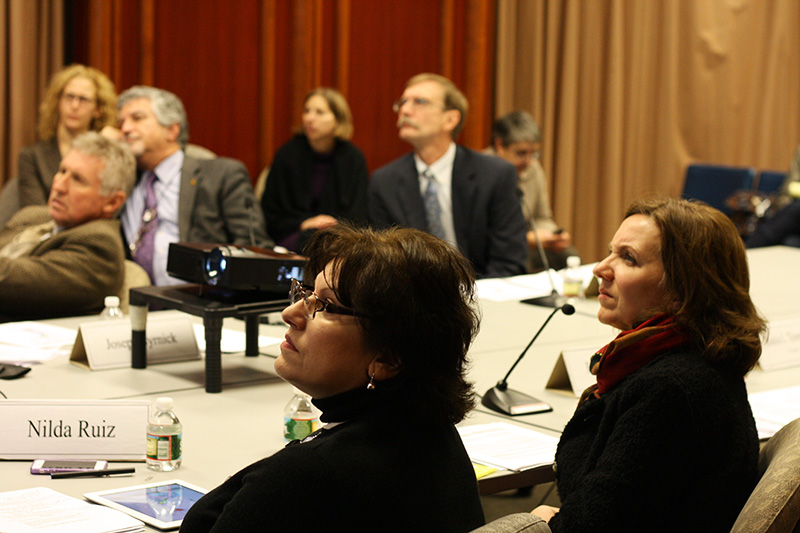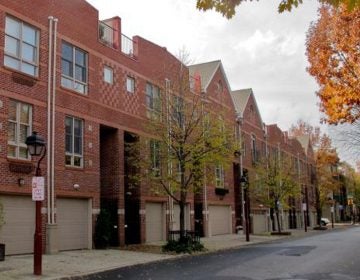Planning Commission opposes bill changing Registered Community Organization requirements

In a unanimous vote Tuesday afternoon, the Philadelphia City Planning Commission declined to recommend a zoning code amendment bill which was introduced into City Council last week by 3rd-District Councilwoman Jannie Blackwell. The bill, No. 120889, would adjust the definition of Registered Community Organizations, expand notification requirements for developers going through zoning appeals or Civic Design Review, and allow District Council members to appoint representatives to the Civic Design Review Committee.
The Planning Commission opted to follow the staff recommendation on the bill, which was presented at Tuesday’s monthly meeting by Eva Gladstein, the Commission’s deputy director. Its disapproval of the bill has no legal impact on whether it will move forward; that decision is Council’s alone. A hearing on the bill before Council’s Committee on Rules is scheduled for Tuesday, December 4th.
Several Commissioners, and in particular Nancy Rogo-Trainer, suggested they wanted to take whatever action would create the strongest possibility of the new code going unamended until the mandatory one-year review period. They briefly discussed requesting an additional 45 days before making a recommendation on the bill; that would have allowed the bill to move through Committee but would have prevented Council from taking a vote on it this session.
But Gladstein said that while she disagreed with Councilwoman Blackwell’s amendments, she didn’t believe the concerns would go away. And Commissioner Brian Abernathy said that voting to not recommend the bill rather than delaying it would avoid creating in Council members “a feeling that we’re trying to play games.” Eventually, the Commission voted unanimously to not recommend the bill for approval.
(The Commission did vote to request an additional 45 days to consider two zoning bills introduced by 10th-District Councilman Brian O’Neill.)
The bill addresses concerns raised by a small cadre of neighborhood activists and civic leaders from mainly Point Breeze and West Philadelphia who feel the RCO provision of the new zoning code will let the Planning Commission strip power from small neighborhood groups and bestow it on larger, better organized groups. Moreover, some believe the Planning Commission is employing that power capriciously—and they’ve gotten the ear of Councilwoman Blackwell.
On Friday, Blackwell convened a special hearing in City Council’s Committee on Rules to discuss Registered Community Organizations. The hearing was well-attended both by opponents of the RCO provision and supporters who’d helped craft it during the five-year zoning reform process.
And the points of view differed starkly.
Some, including Councilwoman Blackwell, believe the code’s requirements for becoming an RCO are too strict, while others say they are too lenient. Some, including Blackwell, believe that everyone within a square block of a project requiring zoning approval or design review should be notified, while others say that would be an unreasonable burden on the developer. Some, including Blackwell, believe Council members need to assure the zoning process is properly “inclusive,” while others, including the Daily News, say Council should stay out of it and let the new code settle in.
What the code says
As defined in the zoning code, a local Registered Community Organization is a neighborhood group that registers with the Planning Commission, and which receives notice when a developer proposes a project within its stated boundaries that needs zoning board approval or Civic Design Review. The Planning Commission’s regulations require RCOs to declare their boundaries when applying to the Commission. RCOs must have an area of interest of at least five blocks and at most seven square miles. They must hold regularly scheduled, public meetings, have a stated mission that involves some aspect of land use, and choose leaders through elections.
Neither the code nor the PCPC regulations say that the Zoning Board of Adjustment, the Planning Commission, or any other city agency should give more deference to an RCO than another group or individual when making decisions related to zoning or development. RCOs have no special privileges to testify before the Planning Commission or the ZBA. Neither the new code nor the PCPC regulations bar anyone from speaking at the ZBA, the Planning Commission, or the Civic Design Review Committee. The latter two are explicitly open to any member of the public who wishes to speak on a given project, as are City Council hearings.
The new code does require developers to notify RCOs when he or she is building certain projects in their areas, and to meet with any registered group when seeking zoning approval. The Civic Design Review Committee reserves a seat for a representative of an RCO in the vicinity of a CDR project.
Still, representatives of some organizations—including the West Philadelphia Coalition of Neighborhoods and Businesses, Concerned Citizens of Point Breeze, and West Powelton Concerned Community Council—fear that communities’ and less-organized groups’ ability to meet and negotiate with developers is stripped by the RCO provision of the new code. Councilwoman Blackwell shares their fears.
At Friday’s hearing, Blackwell said that while the Zoning Code Commission’s intentions may have been good, the RCO provision makes for a less inclusive development process.
She said the RCO provision was confusing.
“If [Council members] don’t understand it,” Blackwell said, “how can we expect John and Jane Q. Public to understand it?”
She said its eligibility requirements were too onerous for small groups.
“The intentions may have been good, but it just didn’t work out that way,” Blackwell said. “There’s just too much, it’s just too difficult and it’s just too hard.”
And she said efforts to keep duly elected officials out of the zoning process were misguided and only served the groups who were well organized.
“We run this,” she reminded Matt Ruben, of Northern Liberties Neighborhood Association, during one particularly heated exchange at the hearing, slamming her finger on the Committee desk, and repeated, “We run this.”
Blackwell did not return a phone call from PlanPhilly on Monday.
Witnesses who testified on Friday in favor of keeping the RCO provision as codified included not only Matt Ruben but Kiki Bolender and Harris Sokoloff, who co-directed the project Common Ground for Building Our City during the zoning reform process. One witness, Amara Rockar, a West Philadelphia resident, said that some small groups would have trouble meeting the expanded notification requirements proposed by Councilwoman Blackwell.
“I want to emphasize that the concern should be: how do we empower and help neighborhood groups build capacity so they’ll be in a place to run zoning meetings, if they want to be in a position to participate in that process,” Rockar told PlanPhilly.
Parties on opposite sides of this issue claim the democratic high ground. Proponents of the new code, RCOs and all, say that Council should respect the long, open, transparent, and inclusive process that brought zoning code reform to Philadelphia—at least until the one-year review period, which Council itself requested. Opponents say that any effort to involve more groups in the zoning process on an ongoing basis should be encouraged, despite the new code’s stated goal of making development more streamlined and predictable.
Contact the reporter at jaredbrey@gmail.com and follow him on Twitter @jaredbrey
WHYY is your source for fact-based, in-depth journalism and information. As a nonprofit organization, we rely on financial support from readers like you. Please give today.






